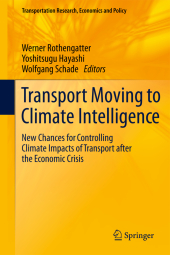 Neuerscheinungen 2013Stand: 2020-01-07 |
Schnellsuche
ISBN/Stichwort/Autor
|
Herderstraße 10
10625 Berlin
Tel.: 030 315 714 16
Fax 030 315 714 14
info@buchspektrum.de |

Yoshitsugu Hayashi, Werner Rothengatter, Wolfgang Schade
(Beteiligte)
Transport Moving to Climate Intelligence
New Chances for Controlling Climate Impacts of Transport after the Economic Crisis
Herausgegeben von Rothengatter, Werner; Hayashi, Yoshitsugu; Schade, Wolfgang
Repr. d. Ausg. v. 2011. 2013. xii, 316 S. 7 Tabellen. 235 mm
Verlag/Jahr: SPRINGER, BERLIN 2013
ISBN: 1-461-42852-1 (1461428521)
Neue ISBN: 978-1-461-42852-7 (9781461428527)
Preis und Lieferzeit: Bitte klicken
Transportation accounts for roughly a third of greenhouse gas emissions, and it remains a growing sector. This book offers practical suggestions in its analysis of the challenge transport presents today, as well as examining its role in future climate policy.
Transportation contributes to roughly a fifth of greenhouse gas emissions, and as a growing sector of the economy, its contribution to climate change, if remained unchanged, could even grow. This is particularly true in the developing world, where the growth rates of air and ship transport are expected to exceed those of the EU, and worldwide objectives to curb greenhouse gas emissions by 2050 by sixty to eighty percent could be placed in serious jeopardy. This book addresses the key issues of controlling transportation growth and identifying and implementing measures that would significantly reduce the emissions of greenhouse gases from transport while maintaining its vital role in generating prosperity and mobility for future generations. This book describes the challenge that transport constitutes today as well as its role in the future for climate policy. It will discuss and provide hands-on suggestions for transportation policy that will mitigate the greenhouse gas emissions from transport.
The book is organized into five parts. Part One presents an overview of transport and climate policy in the context of the recent economic crisis. Part Two examines the problems and proposed solutions for curbing emissions from transport in industrialized countries while Parts Three and Four deal with the developing world, with a particular focus on India and China. Part Five discusses tested solutions and provides policy recommendations making this book of interest to a broad audience of both policy-makers and academics concerned with the role of transport in reducing global climate change.
A Sustainable Pathway to the Next Century.- Status of the Climate Debate and the Book´s Contents.- Economic Crisis and Consequences for the Transport Sector.- Transport in the Past and Current Climate Policy Regime.- Low Carbon Urban Development of Developed Megapolis: The Case of London.- Getting into the Right lane for Low-Carbon Transport in the EU.- Japanese Efforts to Solve Environmental Problems with a Focus on the Transport Sector.- Urban Transport and the Environment in Developing Countries: Complexities and Simplifications.- Carbon Dioxide Emissions from Urban Road Transport in Latin America: CO2 Reduction as a Co-benefit of Transport Strategies.- Spatial Planning Strategy towards Low-carbon City in China.- The Role of Rail Transport for Sustainable.- Financing Technology Transfer.- Internalizing External Costs of Transport with a Focus on Climate Change.- Downstream Emissions Trading for Transport.- Passenger Mobility and Climate Constraints: Planning for Mitigation through Adaptation.- Potential of Biofuels to Reduce Greenhouse Gas Emissions of the European Transport Sector.- Technological Potential for CO2 Emission Reductions of Passenger Cars.- Transport, Environment and Institutions: Why Good Science, Engineering and Economics Fail.- Converting the Unconverted and Establishing Financial Incentives.


